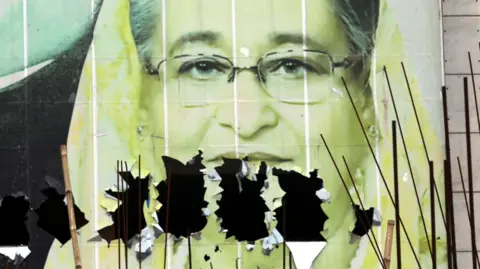 EPA-EFE/REX/Shutterstock
EPA-EFE/REX/ShutterstockNobel Peace Prize winner Muhammad Yunus will serve as chief adviser to Bangladesh’s interim government, the President’s Office announced.
The presidential office said the decision was made in a meeting attended by President Mohamed Shahabuddin, military leaders and representatives of student anti-discrimination groups.
The incident came a day after Prime Minister Sheikh Hasina was ousted from power and fled the country, following weeks of student-led protests that descended into deadly unrest.
Student leaders have made it clear that they will not accept a military-led government and insist that Mr Yunus lead an interim government.
“When the students who have made so many sacrifices ask me to step forward during these difficult times, how can I say no?” said Yunus, who took on the role.
According to his spokesperson, he was returning to Dhaka from Paris to undergo a minor medical procedure.
“The President has asked the people to help him overcome the crisis. This requires the swift formation of an interim government,” the President’s Office said in a statement.
More than 100 people were killed in violent clashes across Bangladesh on Monday, according to local media, the deadliest day since mass protests began.
Hundreds of police stations were also set on fire, and the Bangladesh Police Services Association (BPSA) declared a strike “until the safety of all police personnel is ensured”.
The group blamed the authorities and claimed they were “forced to launch”.
In total, it is estimated that more than 400 people were killed as government forces cracked down on the protests.
The Bangladeshi President’s Office said on Wednesday that the country’s national police chief had been sacked.
The protests began in early July as peaceful protests by university students demanding the abolition of civil service quota systems, but gradually grew into an anti-government movement.
Weeks of unrest culminated in an attack on the prime minister’s official residence shortly after Ms Hasina fled into exile in neighbouring India, ending her nearly 15-year rule.
Hours after her resignation, Bangladesh Army Chief of Staff General Waqer-uz-Zaman promised to form an interim administration, adding on state television that “it is time to stop the violence.”
Former prime minister and main opposition leader Khaleda Zia has been released from house arrest after years of detention, a presidential statement said Tuesday.
She is the leader of the Bangladesh Nationalist Party (BNP), which boycotted the 2014 and 2024 elections, saying free and fair elections were impossible under Ms Hasina’s rule.
The BNP wanted the vote to be held under a neutral transitional administration, which is now possible after the departure of Ms Hasina, who has always rejected this demand.
Mrs Zia, 78, served as Bangladesh’s prime minister from 1991 to 1996 but was jailed in 2018 on corruption charges. But she said the charges were politically motivated.
She was not the only opposition figure to be released after years of detention.
Activist Ahmad bin Qasem was also released, according to his lawyer Michael Pollock.
Rights groups say Mr Qasem was abducted by security forces in 2016, just one of hundreds of enforced disappearances in the country during President Hasina’s rule.
“There were many moments while he was in custody when people feared he was dead, and that uncertainty was one of the many tools of repression used by the regime,” Mr Pollock said, adding that he hoped the decision to release political prisoners would be a “positive signal about their intentions.”
“Unfortunately, the good news will not reach everyone,” he told the BBC, adding that several political prisoners had died in custody.
At least 20 relatives of political prisoners gathered outside a military intelligence unit building in the capital Dhaka on Tuesday, desperately waiting for news of their loved ones, AFP reported.
“We need answers,” said Sanjeeda Islam Tuli, coordinator of the Myer Dark (Mothers’ Call) campaign group.
Across the border in India, External Affairs Minister S Jaishankar expressed “deep concern” in Bangladesh until law and order is restored. India shares a 4,096-km (2,545-mile) border with Bangladesh and has close economic and cultural ties.
He confirmed for the first time publicly that Ms Hasina had requested to travel to India on “very short notice” and had subsequently arrived in Delhi.
India has deployed additional troops along its border with Bangladesh.
“Our border guards have also been instructed to be on exceptional alert in view of this complex situation,” said Mr Jaishankar.





/cdn.vox-cdn.com/uploads/chorus_asset/file/25561776/1252297633.jpg?w=150&resize=150,150&ssl=1)
